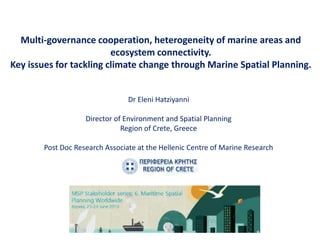
International Conference on Maritime Spatial Planning, DG MARE, Azores, Portugal, June 2016
- 1. Multi-governance cooperation, heterogeneity of marine areas and ecosystem connectivity. Key issues for tackling climate change through Marine Spatial Planning. Dr Eleni Hatziyanni Director of Environment and Spatial Planning Region of Crete, Greece Post Doc Research Associate at the Hellenic Centre of Marine Research
- 2. Competing activities within MA Ecosystem Approach (Overarching MSP Principle) Intensively used maritime area Ecological impact Available Scientific Data Existed Tools (GIS /Stakeholders Platforms) National supportive legislation International Cooperation Monitoring/evaluation MP or ICZM National/regional framework Ecosystem-based management is ‘‘an integrated approach to management that considers the entire ecosystem, including human”
- 3. Heterogeneity of the sea: spatially heterogeneous patterns of topography, water stratification and movement, living things, and human interests and impacts. in time, with some important processes carried out on time scales of hours, days, or months, and others over years, decades, or centuries Mapping biophysical conditions and human uses in the oceans: an important first step in defining place. Complexity of natural processes in the sea: results in mosaic patterns in space and time Marine Ecosystems occur at various scales and their components are linked primarily by physical and biological features. Biophysical component of marine ecosystems: provides the basic template on which all human activities occur and that various forms of governance regulate. Dispersal and connectivity: crucial in sustaining marine populations and habitats: Connectivity in the sea and existing boundaries for corresponding ecosystems Outline points
- 4. Changes in the conditions for aquaculture, fisheries, energy production, recreation, maritime traffic, tourism and rest activities in the coastal zone Changes in sea temperature, sea level, air pressure and wind conditions Changes in the geographical distribution and population of species Influences : • the ecosystem • the human activities on the sea and the coastal zone CLIMATE CHANGE o Physical and biochemical parameters o Ecosystems & Dispersal of species o Connectivity at sea o Heterogeneity of sea basins o Human activities o Existing regulatory frameworks o Adaptations to new “environment” o Socio economic values and parameters o Increasing of knowledge Climate change on marine environment
- 5. • How established marine protected areas can play a role in climate change adaptation and responses through a MSP • Physical phenomena caused by climate change> a new environment where MSP is being implemented • MSP acting as a “buffer” – procedure for increasing the resilience to climate change in service of sustainable development • How countries have incorporated climate change into MSP • Flexibility into MSP is necessary to address existing stressors that reduce marine ecosystems’ resilience, because of climate change effects in the marine environment Planning issues raised in a changing marine environment
- 6. MSP Potentiality +, - Intensively used Available Data MP/ICZM Framework Cooperation W Mediterr (4) √ √ √ √ Alboran Sea (2) √ √ √ √ Area around Malta (3) √ √ √ √ Adriatic Sea (1) √ √ √ √ Aegean Sea (7) ? …. …. …. Libyan Sea (8) ? …. …. …. Levantine Sea / SE Cyprus (5&6) ? …. …. …. Have we allocated spatial (existed or future) distribution of human activities in coastal and marine areas? Are ecological, economic, and social objectives clearly described ? Are we prepared as a society to adapt human uses and relative policies in a climate change marine environment? Have we developed such a tool combining ecological, socio-economics and policy issues in a continuous marine environment with sea basin peculiarities? But: New Aspect: MSP for a changing marine environment
- 7. UNCLOS ESPOON Convention CBO HELCOM OSPAR Barcelona Convention Bologna Charter Habitats Directive Fisheries Policy Renewable Energy Directive SEA/EIA Directive WDF MSFD Marine and Maritime…. MSP ICZM WFD MSFD MSP implementation Ecosystem Management Public participation Public consultation Social standards Economic Aspects National , sectoral legislation MSP as a tool: through a multilevel governance Why? INTERPLAYING and/or OVERLAPPING REGIME International European/Regional National/Regional
- 8. MSP as a tool : For Sustainable Development, Blue Growth and Job Creation in a changing marine environment How and Who? The role of: • Policy Makers (National, Regional, Local) • Scientific Community • Networks • Stakeholders • General Public Ecosystem , Socio-economic MSP approach Policy Tool for existing and future uses of marine/ocean space And further focusing on adaptations and increasing resilience in a Changing Marine Environment Sustainable development, blue growth, blue economy, and job creation o Connectivity in the sea and ecosystems, o Heterogeneity in the sea AND in the regulatory frameworks o Sea basin peculiarities and environmental conditions o MSP Potentiality and cross border cooperation o Multi governance and scientific guidance MSP should act as an Appropriate “tool” for :
- 9. Thank you! Dr Eleni Hatziyanni Director of Environment and Spatial Planning Region of Crete, Greece Post Doc Research Associate at the Hellenic Centre of Marine Research
